You’re likely here because you’re thinking of getting into game jams and looking for advice, or just curious about what they are! Well, we’ve tried writing a holistic guide, applicable to jams for both video and tabletop games!
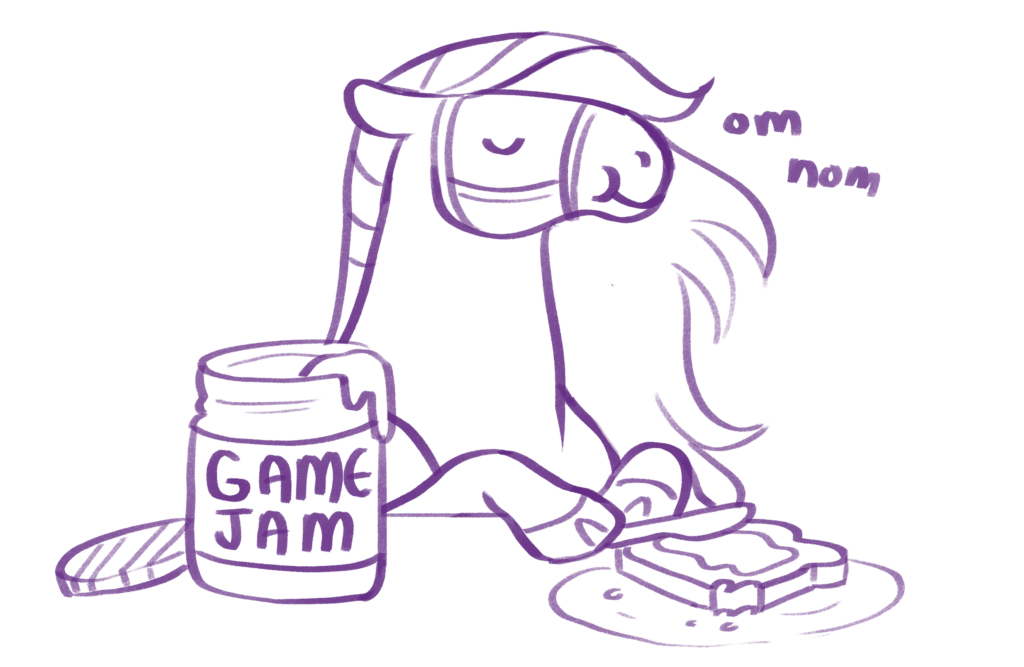
Outline
- What are game jams?
- What are the biggest game jams?
- What games were made in a game jam?
- Why should I join a game jam?
- How to participate in a game jam
- Advice on making the most out of game jams
What are game jams?
Game jams are events where games are created with specified design constraints. To elaborate, these events, whether in-person or online, encourage game devs to create games with design restrictions to prompt creativity. These restrictions and game jam themes vary greatly, ranging from any of the following:
- Time:
Most game jams are short, lasting from anything from a few hours to weeks and even years! (Check out the Decade Jam). Generally, all game jams have a set deadline for submissions, likely coming with either simpler or more detailed constraints in response. - Theme/Topic:
Some game jams have specific themes or topics that unify all game submissions. This could be broad fantasy themed game jams, to something as specific as making something based off a niche horror film from the 90s. - Genre:
Most games include gameplay that’s formulaic enough to be sorted by genre, this means platformers, puzzles, FPS and more! These genre based game jams test jammers’ ability to create something unique to these common types of games. - Tools used:
Sometimes, game jams specify which game engines, software or other tools you’re meant to use (or not use). Popular game engines such as GameMaker, Unity and Unreal Engine have regular and popular game jams that use their own products. Beyond that though, there have been game jams that restrict the type of art programs, music/audio software and even medium for traditional artwork. - Platform/Medium:
Beyond tools, the specific platform might result in interesting design constraints. For example, the GameBoy Jam restricts game submissions to requiring the Game Boy’s 60px x 144p aspect ratio and 4 colours. - Artistic assets/Art Direction:
Similar to the tools used, some game jams aim to have art assets of a certain style. For example, having all art assets be made in pixel, or hand drawn! - Inputs:
An interesting design challenge is restricting what sort of player inputs are available for jammers. To give an example, one or two button inputs are sure to encourage focus on the game’s narrative or other elements to make it unique! - Length:
Some game jams even have limitations on how long the game or experience should be, forcing jammers to think critically about what they’d like to deliver to players in such a short time frame. For example, the One Minute Jam asks developers to create memorable impressions within a single minute of gameplay. Tough but potentially creativity inducing! - A hybrid of the aboveMixing things together sometimes helps with reducing the load on game jammers’ to start making something!
- And much much more!
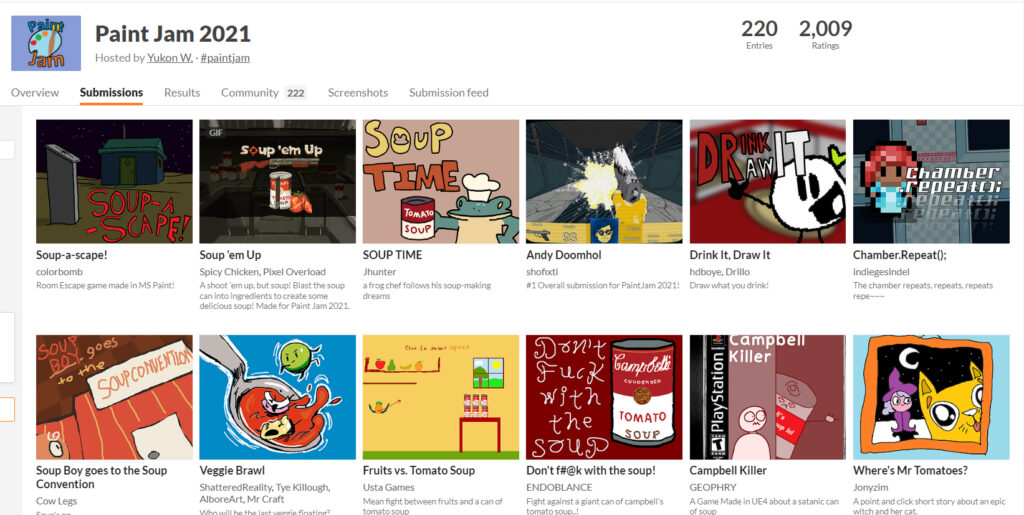
What are the biggest game jams?
There are heaps of game jams running at once everyday, but generally the most popular ones will be tied to either popular content creators (that is, popular streamers, devs, gamers etc.) or organisations (such as Unity, Unreal Engine, GameMaker etc.)
For a full list of some of the game jams hosted on Itch.io, check out this comprehensive calendar. Besides that there’s this giant gantt chart of indie game jams. (Be patient! There’s a lot to load!)
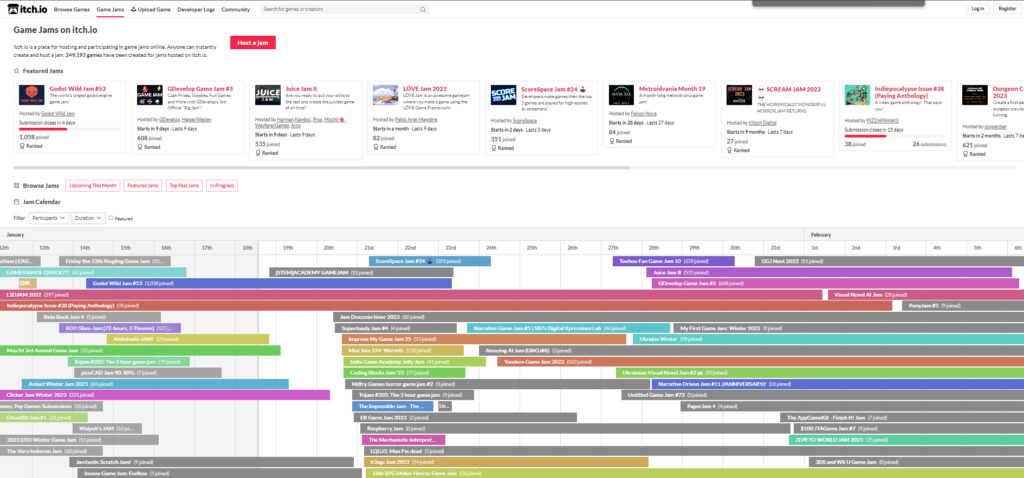
But… those calendars can get overwhelming, so we made a new list! Here are the most popular game jams (for both video games and tabletop games):
- Ludum Dare
- Global Game Jam (UPDATE 23/01/2024: Global Game Jam is kicking off this week! Check out the full list of games and Global Game Jam sites here!)
- Nordic Game Jam
- Unity Play Showcase
- GMTK Game Jam (Game Maker’s Tool Kit)
- Unreal Engine’s Epic MegaJam
- My First game Jam
- GitHub Game Off
- One Page RPG Jam (TTRPG Jam)
- NaNoRenO
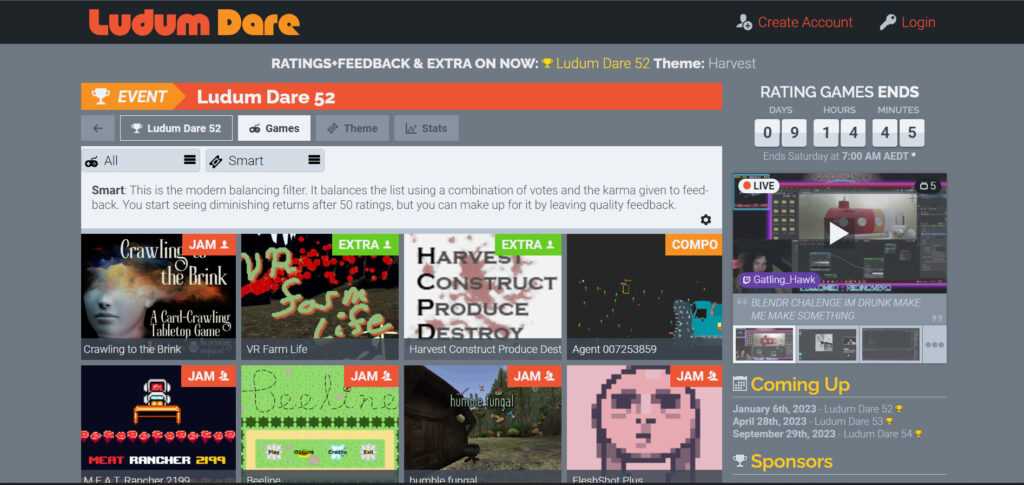
For some popular game jams organised by popular content creators:
What games were made in a game jam?
If you’re asking what game jams went off to be refined, further developed, and reached commercial success… some popular titles are:
And many more! Be sure to check out itch.io for even more, sorted by specific game jams!https://web.archive.org/web/20230208112547if_/https://giphy.com/embed/bKNRMuPMY0hmdFpoO7Commercial success is not a metric to determining the merit of the game you made, especially for a jam!
Why should I join a game jam?
- It’s fun to create!
Part of the joy of making games is, of course, making games. Cool visuals, exhilarating action, touching stories… the process of making these is fun and especially for developers, an essential part of the work!
- Something for the folio
After completing a game jam, you’ll have a new title under your name for your folio! Doing so also keeps your skills sharp and relevant!
- Learn new skills as you experiment
Game Jams are a great way to experience the entirety of the game development cycle, usually in a short span of time! Whether it’s production planning, time management, art asset creation, working with a team and more!
- Be as weird as you’d like
Something that doesn’t get mentioned very often is that games are an art form. Commercialisation limits certain topics or themes for general palatability, but game jams are the space for you to be as weird as you’d like! Whether it’s a niche special interest or “ugly” art style you’d like to explore, that’s entirely up to you!
- Make new friends and connections
In game jams that involve teaming up with strangers, you might meet people who end up being long term connections, potentially even collaborators on future projects. Even amongst solo jams, participating in Discord servers and more are great ways to get to know other jammers!

How to participate in a game jam
What to do before joining a game jam:
- Decide what you’re doing: Is it a solo jam or team? Who are you bringing along?
- Prepare your tools: What sort of software or other tools do you need? Make sure they’re up to date and already working! (We have a blog on tools we use as a game studio if you’re looking for reference!)
- Organising food and drink: To avoid missing meals or eating unhealthily, prep your food beforehand!
What to do during a game jam:
- Ideation: Set time to brainstorm potential ideas, and keep to it! You don’t want to get stuck ideating.
- Getting the GDD together: Synthesise your ideas into a game design document! This will keep things focused when you actually start production!
- Scoping out work and planning: Cut down things and plan how you’ll be using your time!
- Take breaks: Remember to eat and drink and shower! Burnout is ick, and this event is meant to be fun!
- Ask for help: If there are any problems, always reach out to someone for assistance, maybe even encouragement!
- Playtest: Make sure to allocate sufficient time for testing that the game works!
- Strive for done not perfect!
What to do after a game jam:
- Rest and celebrate!
- Post it and receive feedback: In your planning phases, you should strive to allocate some time for submission!
- Play fellow jammers’ games and leave feedback!
- Consider next steps (Optional): Potentially, you might be thinking of taking your project further, whether an expansion, a second instalment or more!
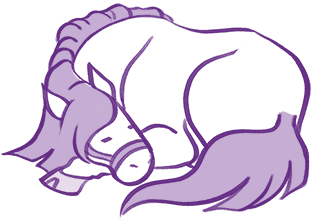
Some advice from the team if you’re joining a jam:
“You want to be spending as much of the jam time as possible implementing stuff, and less time experimenting and scraping stuff. Especially if you’re working solo, it’s not uncommon for teams to throw out the first few days’ efforts and start over because the mechanic wasn’t fun.
To reduce risk and help with narrowing down ideas quicker, I choose a general “genre” and set of base mechanics to commit before the jam. For example, in LD52, I chose “platformer”. Then, when the theme was revealed I worked out if there was a novel way I could innovate on a platformer’s mechanics with that theme, essentially figuring out a “hook” for it. I do this because I understand platformer mechanics and how to juice them, meaning there’s less experimentation involved. I just have to experiment on the novel stuff, be it some mechanic or narrative, which will make the game stand out. When you’re making something “new”, it’s not about creating something entirely new, but building on top of what’s already out there.
Besides this, go with what you know how to use! Whichever tool that doesn’t slow you down and stress you out (Eg. Unity’s loading screens), will save you precious development time. If using something unfamiliar means I am spending 10% of my time coding and 90% of my time searching and reading documentation, then it’s not a good trade off. Choose something you know intimately and lightweight for a jam to reduce the stress! Consider researching learning something else in prep for the next jam instead!
Lastly, expect to fail the first few times! Game jams are hard, and completing something is an achievement. I’m still working out how to be proficient at game jams and what I’ve worked out so far is to just survive a jam and submit something in the end.”
Dom (@dom_dere)
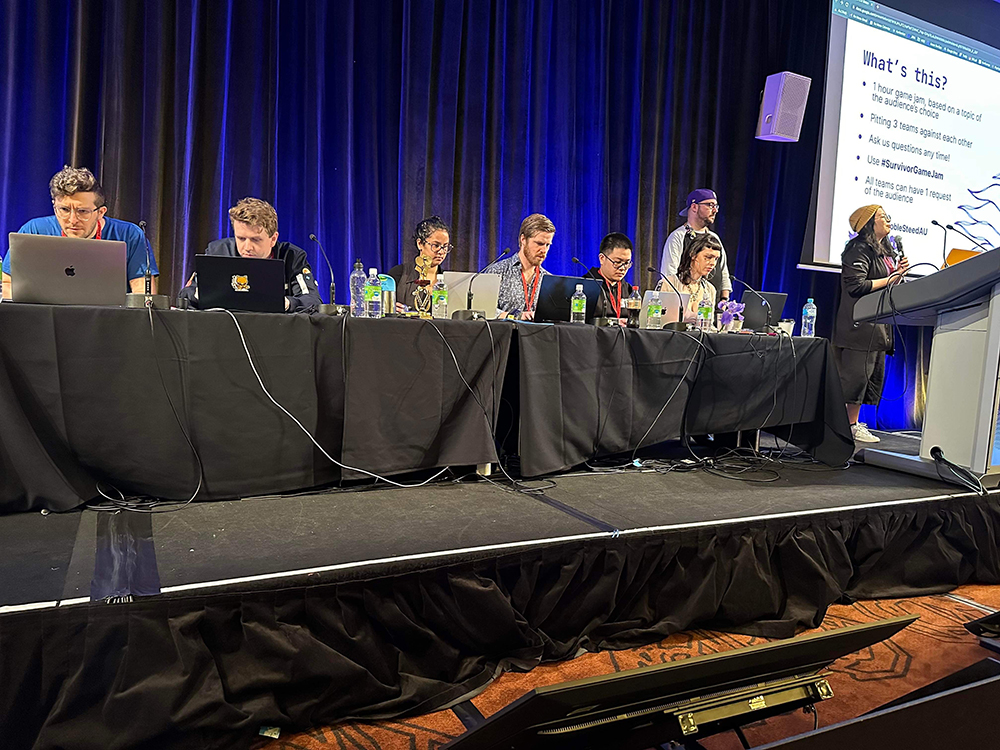
Additionally, we’re the hosts of Survivor Game Jam at PAX, a hectic one hour game jam where pit teams against each other in front of a live audience. If ever you find yourself at PAX AUS, come find us! It’ll be a fun, chaotic and hopefully educational time!
To conclude, we hope this guide has been helpful to those wanting to try their hand at a game jam! Good luck and all the best!
Have a question or want to chat more about game development? Reach out to us!
Other places you can find us:
- Join our Discord server
- Sign up to our newsletter

